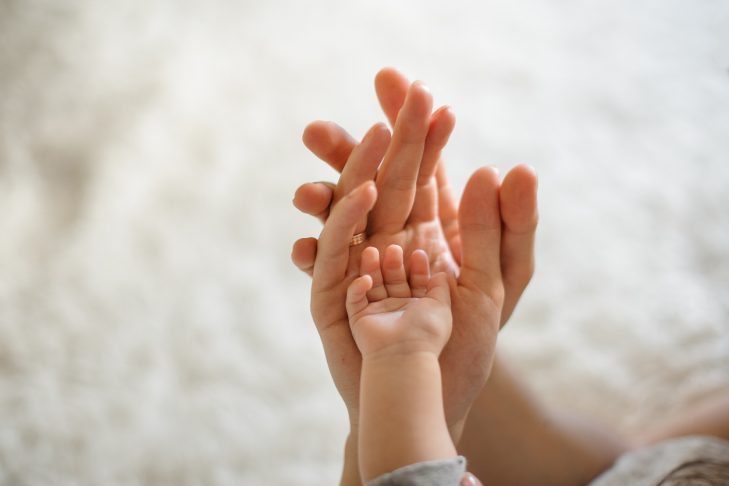My mom used to tell me that even if I wavered in my Jewish observance as a young adult, when I “grow up and have kids” I’ll return to the practice of Judaism. Of course, I would roll my eyes whenever she said this, but it turns out she was pretty much right (as usual). Though I haven’t fully returned to the ways of my modern-Orthodox upbringing, this year—my first year as a mother—I’m finding comfort in the rituals of the Days of Awe and the Jewish New Year. The certainty of these traditions is helping me find my footing amidst the precariousness of my life.
I wanted to believe that becoming a mother didn’t have to mean letting go of my prior self. I thought I could find the trick that nobody else was able to find and somehow manage the dual responsibilities of parenthood and work without letting go of any of my personal interests, habits, relationships or values. For a while, it was going well, and I was finding my rhythm balancing my newfound priorities. My husband and I had a great division of responsibilities that allowed us each to maintain close-enough versions of our prior selves. But when my son was 3 months old and I went back to work full-time, things slowly started to go.
My goal of exercising three times a week, for instance, dwindled to two. Then one. Then it wasn’t worth paying for the gym membership anymore. Maybe biking to work and taking a walk during lunch could count instead? Or when my stash of homemade freezer meals dwindled and getting to the market and cooking consistently became a challenge. Maybe, I thought, we could get takeout once a week. It seemed like such a cop-out, but if it gave me time to enjoy my family, was it worth it?
By most accounts, I’m killing it as a working mom—I’m focused at work, my child is healthy and happy, and I manage to put a homemade meal on the table most nights. I’ve even started the habit of going on a weekly baby-free date with my husband. But I can’t shake the lingering doubt and persistent guilt in the background, asking me if I’m making the right choices or doing enough for my family, or for myself.
Yom Kippur services have always made me uncomfortable. Praying to some unknown Father and King, asking forgiveness for sins I wasn’t sure I committed and breaking rules I wasn’t sure I even cared about. It felt awkward and insincere and was one of the parts of Jewish tradition that was very difficult for me to accept. This year, though, will be different. Instead of asking for atonement from an unknown being, I’ll be seeking mercy from myself.
I’ll ask pardon from myself for letting some pieces of my life fall behind. For not being able to do everything perfectly. For making compromises.
As I bang my fist on my chest, I’ll ask to forgive myself for the sins of letting the laundry pile up, flaking on plans with a friend or ordering a pizza for dinner.
I’ll ask to give myself a break from feeling like I’m not doing enough. From the constant doubt. From the self-imposed pressure.
I’ll ask myself for compassion, for understanding and for patience. I’ll ask myself for the mercy to feel proud of my achievements. I’ll ask for atonement for not being able to be everything to everyone right now. Because I need to be something very specific to a couple of very specific people.
I’ll throw my breadcrumbs into the river for Tashlich and feel the relief as I rid myself of the weight on my shoulders holding all of the guilt.
I’m realizing that parenting truly is a balancing act, and in order to keep the scales level, some things need to be shifted around or even removed altogether. But just because I’m taking certain things off the scale of my life for now, it doesn’t mean they are no longer important or gone for good. May my prayers help me tip the scales toward a favorable self judgement this Yom Kippur.
This post has been contributed by a third party. The opinions, facts and any media content are presented solely by the author, and JewishBoston assumes no responsibility for them. Want to add your voice to the conversation? Publish your own post here. MORE



